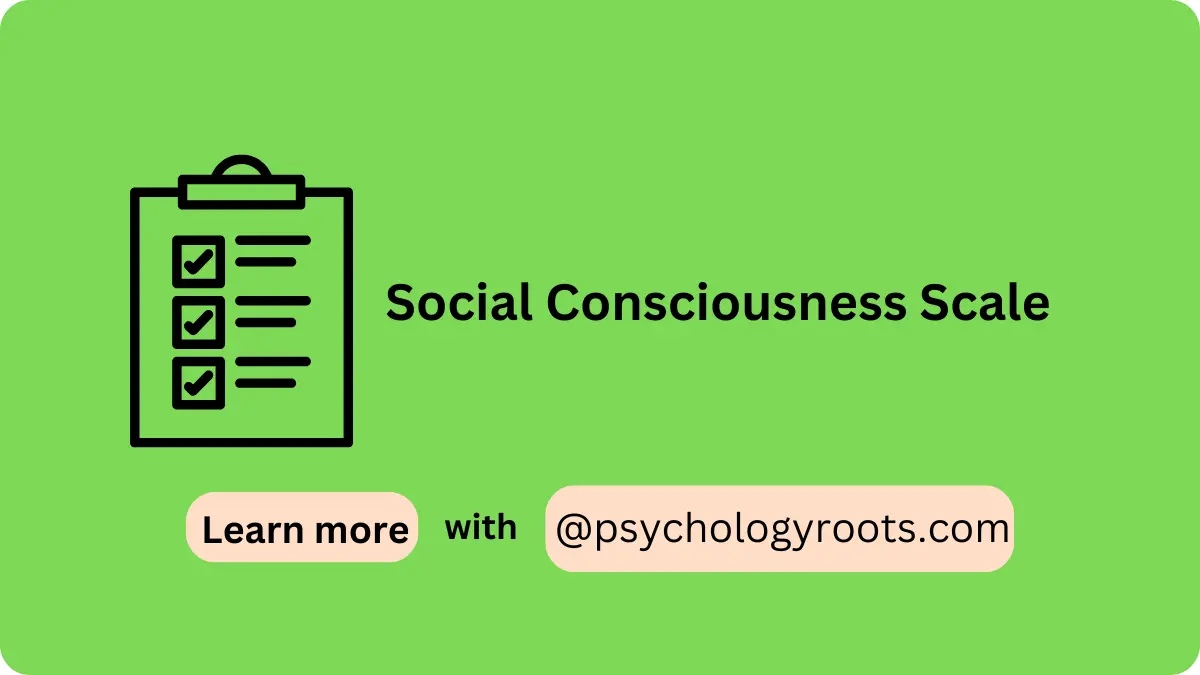Table of Contents
Social Consciousness Scale
Here in this post, we are sharing the “Social Consciousness Scale”. You can read psychometric and Author information. We have thousands of Scales and questionnaires in our collection (See Scales and Questionnaires). You can demand us any scale and questionnaires related to psychology through our community, and we will provide you with a short time. Keep visiting Psychology Roots.
About Social Consciousness Scale
Scale Name
Social Consciousness Scale
Author Details
Robert L. Flewelling, Mallie J. Paschall, and Christopher L. Ringwalt
Translation Availability
English

Background/Description
The Social Consciousness Scale, developed by Robert L. Flewelling, Mallie J. Paschall, and Christopher L. Ringwalt in 1993, is a self-report questionnaire designed to measure perceptions of how one’s behavior affects others among African-American males aged 15-19 in urban settings. Used in violence prevention research, the scale assesses adolescents’ awareness of the social consequences of their actions, aligning with social learning theory (Bandura, 1977) and prosocial behavior frameworks. It was part of studies evaluating psychosocial outcomes in high-risk urban youth, as cited in Paschall and Flewelling (1997).
The scale comprises a small number of items (exact count not specified, likely 4-6 based on similar measures), rated on a Likert-type scale (e.g., 1 = “strongly disagree” to 4 = “strongly agree”), assessing beliefs about the impact of one’s actions on others (e.g., “What I do can hurt others”). Higher scores indicate greater social consciousness. Validated in urban African-American male adolescents, it aims to identify protective factors against antisocial behavior.
Psychologists, educators, and public health researchers use the scale to assess social awareness, though its extremely low internal consistency severely limits its utility. Its cultural specificity is a strength, but its English-only availability and poor psychometric properties restrict practical application.
Administration, Scoring and Interpretation
- Obtain a copy of the Social Consciousness Scale from primary sources, such as Paschall and Flewelling (1997) in Ethnicity and Disease or authorized research archives, ensuring ethical use permissions.
- Explain the purpose to respondents, noting that it assesses their thoughts on how their actions affect others to support positive behavior, emphasizing confidentiality and using culturally sensitive, age-appropriate language.
- Provide instructions, asking respondents to rate each item based on their agreement with statements about social impact, using the Likert scale.
- Approximate time for completion is 2-3 minutes, depending on the number of items and reading ability.
- Administer in a classroom, community center, or research setting, using paper or digital formats, ensuring a private environment. Oral administration may be used for students with reading difficulties.
Reliability and Validity
The Social Consciousness Scale has very poor psychometric properties, as reported by Paschall and Flewelling (1997). Internal consistency is extremely low, with a Cronbach’s alpha of 0.12, indicating negligible item cohesion, likely due to poorly designed items or cultural/developmental variability in interpreting social consequences. Test-retest reliability is not reported, but stability is likely low given the alpha. This level of reliability renders the scale nearly unusable for research or practice without significant revision.
Convergent validity is weakly supported by correlations with prosocial attitudes (r ≈ 0.20-0.30), but the low alpha undermines confidence in these findings. Discriminant validity and criterion validity are not well-established due to limited data and the scale’s poor performance. Factor analyses are not reported, and construct validity is questionable. Researchers should avoid using this scale in favor of more reliable measures, such as the Social Responsibility Scale (Nedwek, 1987).
Available Versions
05-Items
Reference
Flewelling, R. L., Paschall, M. J., & Ringwalt, C. L. (1993). SAGE baseline survey. Research Triangle Park, NC: Research Triangle Institute.
Paschall, M. J., & Flewelling, R. L. (1997). Measuring intermediate outcomes of violence prevention programs targeting African-American male youth: an exploratory assessment of the psychometric properties of six psychosocial measures. Health Education Research, 12(1), 117-128.
Important Link
Scale File:
Frequently Asked Questions
What does the Social Consciousness Scale measure?
It measures perceptions of how one’s behavior affects others.
Who can use the scale?
Researchers studying African-American male youth, though its poor reliability limits use.
How long does the scale take to complete?
It takes about 2-3 minutes.
Is the scale specific to African-American males?
Yes, it targets males aged 15-19 in urban settings.
Can the scale inform interventions?
No, its very low reliability (α = 0.12) makes it unsuitable without revision.
Disclaimer
Please note that Psychology Roots does not have the right to grant permission for the use of any psychological scales or assessments listed on its website. To use any scale or assessment, you must obtain permission directly from the author or translator of the tool. Psychology Roots provides information about various tools and their administration procedures, but it is your responsibility to obtain proper permissions before using any scale or assessment. If you need further information about an author’s contact details, please submit a query to the Psychology Roots team.
Help Us Improve This Article
Have you discovered an inaccuracy? We put out great effort to give accurate and scientifically trustworthy information to our readers. Please notify us if you discover any typographical or grammatical errors.
Make a comment. We acknowledge and appreciate your efforts.
Share With Us
If you have any scale or any material related to psychology kindly share it with us at psychologyroots@gmail.com. We help others on behalf of you.